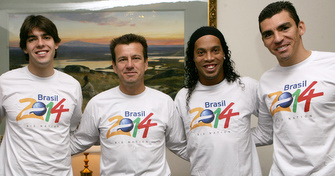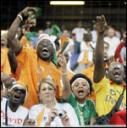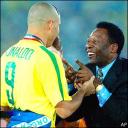A Hands-on Project With No Hands

(from left: Kaka, Dunga, Ronaldinho, Lucio)
Starbury’s a chump. That’s what I was thinking. To hell with him, Richard Jefferson, Lamar Odom, and all the other fakers and never-weres masquerading as a national basketball team. 10 of the real stars on the USA team that was supposed to restore dominance in hoops had opted out, and these jokers shifted up one step from bridesmaid. It was like putting six red shirted officers on an all-time Star Trek crew, or giving Franklin Pierce and William Henry Harrison control of the Former Presidents’ Council. In Athens our American sport took a beating on the grandest stage; an Olympic humiliation supposedly unthinkable since 1991, when the Soviet Union collapsed and USA Basketball assembled the greatest team ever.
But even during those awful losses to Puerto Rico and Argentina, no one on the team came back Stateside to death threats or sport-induced recession.
Yes, all respect to the pituitary struggles and randomly lined court of international basketball, but Earthlings still only live and die with soccer. Its ability to unite disparate and even antagonistic factions never ceases to shock. Ever heard of the Ivory Coast? For four years the West African country endured a crushing, brutal civil war. You’d think it would be impossible to see jubilation through all the smoke, but the countries’ citizens (and their expatriate refugees) erupted in a national celebration when the nation qualified for the 2006 World Cup after decades of failure.  That team was an even mix of players from Muslim, northern rebel areas and the government backed Christian ruling elite of the south. On the pitch the Elephants, as they are known, fought their way through African qualifying matches to reach their first World Cup final.
That team was an even mix of players from Muslim, northern rebel areas and the government backed Christian ruling elite of the south. On the pitch the Elephants, as they are known, fought their way through African qualifying matches to reach their first World Cup final.
Players like these are the reason that the World Cup is the real spiritual successor to the ancient Olympics; eleven men and a ball halt wars. Every four years the grandest of professional tournaments offers action and, sometimes, hope. Just last week FIFA, governing body/benevolent despot of the soccer world, awarded South American representative Brazil the 2014 World Cup, its first such honor in 64 years. The Cup, even moreso than the Olympics, is the world’s big time sporting event, replete with all the fanfare, corporate sponsorship, and rich history of the Games but firmly tied to the sport; professional athletes playing a professional game. Yes, the Cup is rooted in nationalism (one nation to a side), but it lacks so much of the nagging political overtones of the Olympic Games. It may not be as egalitarian as other international competitions (only 32 enter the den), but the simple rules and cheap costs of promoting the game ensure that not only will the best nation win, but more importantly any nation can win.
No nation does win as much as Brazil. Since 1950, Brazil has appeared in seven of 15 World Cup finals, winning five. The yellow jerseys are as intimately tied to the sport as the Yankee pinstripes or Montreal’s red, white and blue sweaters. Brazilian soccer is a fluid, acrobatic, high-octane ballet that dazzles even casual fans nearly as often as it puts the ball in the back of the net. From Romario to Ronaldo to Ronaldinho,  the modern team has shone on the world stage; its only real competition is with Brazilians’ memories of Didi, Garrincha, and the incomparable Pele. (The 1970 Cup winning team is almost undoubtedly the greatest team of all time, trailing just 36 out of 540 minutes during the tourney.) The World Cup in Brazil is like having the Games in Greece or the Oscars in Hollywood, a no-brainer on any level. The final, in the fabled Maracanã, could draw 200,000 shrieking, jubilant pilgrims, an instant classic before the kickoff.
the modern team has shone on the world stage; its only real competition is with Brazilians’ memories of Didi, Garrincha, and the incomparable Pele. (The 1970 Cup winning team is almost undoubtedly the greatest team of all time, trailing just 36 out of 540 minutes during the tourney.) The World Cup in Brazil is like having the Games in Greece or the Oscars in Hollywood, a no-brainer on any level. The final, in the fabled Maracanã, could draw 200,000 shrieking, jubilant pilgrims, an instant classic before the kickoff.
So, why the apprehension around the sporting world? Well, unfortunately Brazil has a bit of a debt problem. Its basic social services and safety nets are under siege with the social security system untenable. It’s a wonder the sport will come to Brazil as the nation’s ability to attract foreign investment is nearly nonexistent. The 2002 election of Luiz Inácio Lula da Silva  may well have saved the country from defaulting on its own loans. Good thing too; FIFA doesn’t smile on being an embarrassed guest when the host can’t pay the bill. Brazil also has an infrastructure problem for their sporting venues. To be accurate, it’s a total infrastructure problem. According to FIFA in their report assessing Brazil’s 2014 bid, not a single one of the nine league stadiums around the country pass muster in hosting a large-scale international competition. Repair costs are estimated at $1.1 billion; how many nations can you name that have hosted a World Cup on private finance?
may well have saved the country from defaulting on its own loans. Good thing too; FIFA doesn’t smile on being an embarrassed guest when the host can’t pay the bill. Brazil also has an infrastructure problem for their sporting venues. To be accurate, it’s a total infrastructure problem. According to FIFA in their report assessing Brazil’s 2014 bid, not a single one of the nine league stadiums around the country pass muster in hosting a large-scale international competition. Repair costs are estimated at $1.1 billion; how many nations can you name that have hosted a World Cup on private finance?
Despite the serious cash flow problem in the capital, there are still quite a few people to rob. Over the last quarter century, robberies have become another national pastime. The Overseas Security Advisory Council lists Brazilian crime as a “major issue”. Most, if not all major cities are centers for “Quicknappings” designed to incite fear and produce a quick and small ransom. That’s not the worst part. Brazil’s murders numbered 55,000 in 2005, approximating the numbers for a warzone Iraq. In Sao Paolo, the largest city, the 7,000+ murders of ’05 rose upwards during two riots between gangs and police in the summer of 2006. Not to generalize, but the rich/poor divide, so massive in Brazil, breeds inequality and crime in cities far more than rural areas. The nearly 3,000,000 estimated different fans pouring into the country more than likely won’t spend their days hacking their way through the rainforests. They’ll be buying pins and sampling cuisine in the streets outside the stadium. You don’t have to be a chief of police to know that some streets will be safe and some streets won’t.
These are problems, but acknowledging them is key to the effort. As more world-wide sporting events move away from the developed world and increasingly towards Africa, Asia, and South America, social issues cloud their prospects for success. Beijing’s  pollution and human rights problems fit right in with South Africa’s (World Cup 2010) infrastructural problems and urban terror on the streets of Rio de Janeiro. Then again, Munich and Atlanta were lauded as “safe” before the cold lights flashed. Seven years is a long time for a country to do anything. Perhaps by shining a light unto the darkness (and what a hell of a light the World Cup is) the problems will solve themselves before the first boot. Soccer belongs in Brazil and it’s not going to leave because of thuggery. There are 80 months to go before the only month that matters begins. It’s up to Brazil to foot the bill.
pollution and human rights problems fit right in with South Africa’s (World Cup 2010) infrastructural problems and urban terror on the streets of Rio de Janeiro. Then again, Munich and Atlanta were lauded as “safe” before the cold lights flashed. Seven years is a long time for a country to do anything. Perhaps by shining a light unto the darkness (and what a hell of a light the World Cup is) the problems will solve themselves before the first boot. Soccer belongs in Brazil and it’s not going to leave because of thuggery. There are 80 months to go before the only month that matters begins. It’s up to Brazil to foot the bill.